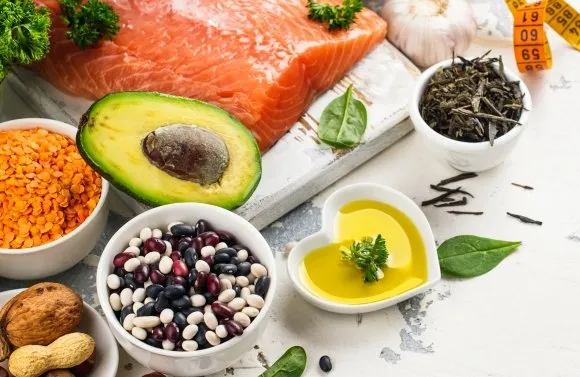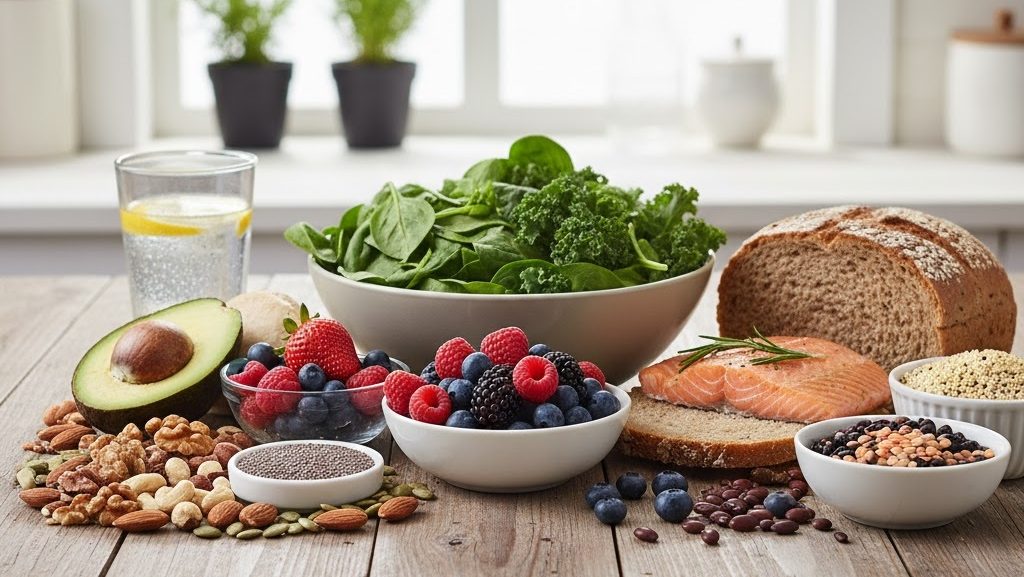Heart disease remains the leading cause of death in the United States, according to the Centers for Disease Control and Prevention (CDC). But here’s the reassuring news: many cases of heart disease are preventable through lifestyle changes, especially by adopting a heart-healthy diet.
Food choices directly impact cholesterol levels, blood pressure, inflammation, and weight management—all major risk factors for cardiovascular disease. By focusing on nutrient-rich foods and limiting processed items, you can nourish your heart while enjoying delicious meals.
This article explores the best foods for heart health, explains what to limit, and offers U.S.-specific dietary tips, backed by scientific research from leading universities.
Why Diet Matters for Heart Health
A poor diet is one of the strongest predictors of heart disease. Research from Harvard T.H. Chan School of Public Health highlights that diets rich in whole grains, vegetables, fruits, nuts, and fish are associated with lower risks of coronary heart disease. Meanwhile, diets high in added sugars, refined carbs, and processed meats increase cardiovascular risk.
Nutrition impacts the heart in multiple ways:
- Cholesterol management: Certain foods lower LDL (“bad”) cholesterol while raising HDL (“good”) cholesterol.
- Blood pressure control: Potassium-rich foods help balance sodium intake and reduce hypertension.
- Inflammation reduction: Antioxidants in plant-based foods protect arteries from damage.
- Weight balance: Healthy eating reduces obesity risk, a major heart disease factor.
The Foundation of a Heart-Healthy Diet
Before diving into specific foods, it’s important to understand the core principles of heart-healthy eating:
- Prioritize plant-based foods (fruits, vegetables, legumes, nuts, whole grains).
- Choose lean proteins (fish, skinless poultry, plant proteins).
- Limit unhealthy fats (saturated and trans fats).
- Embrace healthy fats (omega-3s, monounsaturated fats).
- Reduce added sugars and salt.
- Practice portion control to maintain a healthy weight.
Top Foods for a Healthy Heart
1. Fatty Fish (Salmon, Mackerel, Sardines)
- Why it’s good: Rich in omega-3 fatty acids that reduce inflammation, lower blood pressure, and decrease triglycerides.
- Research: A study published in the Journal of the American Heart Association found that regular fish consumption lowers the risk of sudden cardiac death.
- Tip: Aim for two servings of fatty fish per week as recommended by the American Heart Association.
2. Whole Grains (Oats, Brown Rice, Quinoa, Whole Wheat)
- Why it’s good: Provide fiber that lowers LDL cholesterol and stabilizes blood sugar.
- Research: Harvard researchers found that people who eat whole grains daily have a 22% lower risk of heart disease.
- Tip: Replace white bread and pasta with whole-grain alternatives.
3. Leafy Greens (Spinach, Kale, Swiss Chard)
- Why it’s good: Packed with vitamins, minerals, and antioxidants like lutein, which improve arterial health.
- Research: A University of Cambridge study showed that nitrate-rich vegetables reduce blood pressure naturally.
- Tip: Add a serving of leafy greens to at least two meals per day.
4. Berries (Blueberries, Strawberries, Raspberries)
- Why it’s good: High in anthocyanins and antioxidants that reduce oxidative stress.
- Research: A study by Harvard Medical School linked regular berry consumption with improved vascular function.
- Tip: Use berries as a natural sweetener in oatmeal or yogurt.
5. Nuts and Seeds (Almonds, Walnuts, Flaxseeds, Chia Seeds)
- Why it’s good: Provide healthy fats, plant sterols, and magnesium for heart rhythm regulation.
- Research: The Nurses’ Health Study found that women who ate five or more servings of nuts per week had a 30% lower risk of heart disease.
- Tip: Snack on a small handful of unsalted nuts instead of chips.
6. Beans and Legumes (Lentils, Chickpeas, Black Beans)
- Why it’s good: Excellent source of plant protein and soluble fiber.
- Research: A study in Nutrition, Metabolism & Cardiovascular Diseases found that legumes reduce cholesterol and improve blood sugar control.
- Tip: Replace red meat with beans at least twice a week.
7. Olive Oil (Extra Virgin)
- Why it’s good: A staple of the Mediterranean diet, rich in monounsaturated fats.
- Research: The PREDIMED study (Spain) demonstrated that olive oil reduces the risk of major cardiovascular events.
- Tip: Use olive oil for salad dressings or light sautéing instead of butter.
8. Avocados
- Why it’s good: Provide heart-healthy fats and potassium, which regulate blood pressure.
- Research: A study from Penn State University showed that eating one avocado a day lowers LDL cholesterol.
- Tip: Swap mayonnaise with mashed avocado for a healthier spread.
9. Dark Chocolate (70% Cocoa or Higher)
- Why it’s good: Contains flavonoids that improve circulation.
- Research: Moderate consumption has been linked to lower heart disease risk in studies from Johns Hopkins University.
- Tip: Enjoy small portions—too much chocolate adds excess sugar.
10. Green Tea
- Why it’s good: Rich in catechins that improve cholesterol profiles.
- Research: A Japanese study found that green tea drinkers had a 20% lower risk of cardiovascular death.
- Tip: Replace sugary sodas with green tea for a daily health boost.
Foods to Limit for a Healthy Heart
Not all foods support cardiovascular health. These should be reduced or avoided:
- Processed meats (bacon, hot dogs, sausages): High in sodium and nitrates.
- Refined carbohydrates (white bread, pastries): Spike blood sugar.
- Sugary drinks (sodas, energy drinks): Increase risk of obesity and diabetes.
- Excessive sodium: Raises blood pressure.
- Trans fats (found in some packaged snacks and margarine): Increase LDL cholesterol and inflammation.
A Sample Heart-Healthy Daily Meal Plan
| Meal | Example |
|---|---|
| Breakfast | Oatmeal topped with blueberries, chia seeds, and a drizzle of almond butter. |
| Snack | A handful of unsalted walnuts and green tea. |
| Lunch | Grilled salmon salad with kale, avocado, and olive oil vinaigrette. |
| Snack | Apple slices with hummus. |
| Dinner | Quinoa with roasted vegetables and black beans. |
| Dessert | A small square of dark chocolate (70% cocoa). |
U.S.-Specific Dietary Tips for Heart Health
- Follow the DASH Diet (Dietary Approaches to Stop Hypertension): Endorsed by the National Heart, Lung, and Blood Institute, DASH emphasizes fruits, vegetables, whole grains, and reduced sodium.
- Mediterranean Diet Adaptation in America: Researchers from the University of Minnesota found that adapting Mediterranean principles to American food culture significantly improves heart outcomes.
- Smart Grocery Shopping: Choose foods labeled “low sodium,” “whole grain,” and “no added sugar.”
- Restaurant Eating: Opt for grilled instead of fried, request dressings on the side, and limit portion sizes.
- American Portion Control: U.S. portion sizes are larger than in many countries; practice mindful eating to avoid overeating.
How Lifestyle Complements Diet
While diet plays a major role, lifestyle habits amplify heart health benefits:
- Exercise regularly: At least 150 minutes of moderate aerobic activity weekly.
- Maintain a healthy weight: Reduces strain on the heart.
- Limit alcohol: Excessive intake raises blood pressure.
- Quit smoking: One of the most powerful ways to reduce heart disease risk.
- Manage stress: Meditation, yoga, and adequate sleep improve cardiovascular resilience.
FAQs About Heart-Healthy Eating
1. What’s the single best food for heart health?
There isn’t one “superfood”—a balanced diet of whole grains, fruits, vegetables, nuts, and fish is best.
2. Can I eat eggs if I want a healthy heart?
Yes, in moderation. Recent studies show that eggs do not significantly increase heart disease risk when part of a balanced diet.
3. Is coffee good or bad for heart health?
Moderate coffee consumption (2–3 cups daily) may reduce heart disease risk, but avoid excessive sugar and cream.
4. What’s the best cooking oil for heart health?
Extra virgin olive oil is the top choice, but avocado oil and canola oil are also heart-friendly.
5. Do supplements like fish oil help?
Supplements may help those with deficiencies, but eating whole foods (like fatty fish) is more effective.
6. How much salt is safe per day?
The American Heart Association recommends no more than 1,500–2,300 mg of sodium daily.
7. Can kids follow a heart-healthy diet?
Absolutely. Starting children on fruits, vegetables, whole grains, and lean proteins builds lifelong habits.
8. What’s the difference between saturated and unsaturated fats?
- Saturated fats: Found in butter, cheese, fatty meats (limit intake).
- Unsaturated fats: Found in olive oil, nuts, fish (heart-healthy).




